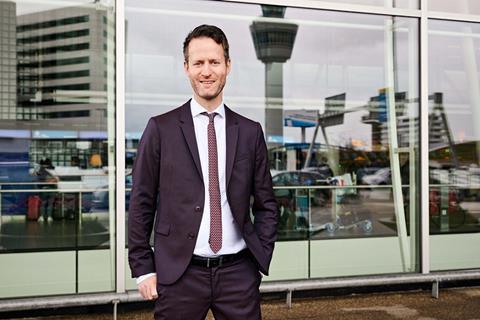
Joost van Doesburg has decided to step down from his position as head of cargo at Royal Schiphol Group with the airport citing “unjust defamatory allegations” made against him in its response to the news.
Royal Schiphol Group did not elaborate on what these allegations were, but van Doesburg is not the first to exit a role at Schiphol following conflict over operations. The Group said in a press release on December 9 that van Doesburg had decided to step down from Royal Schiphol Group as of February 1, 2025.
“We respect his decision but deeply regret it, both for him and for Schiphol. Unjust defamatory allegations have been made against him, and business-related criticism of Schiphol has been made personal, resulting in media coverage,” said Patricia Vitalis, executive director Schiphol operations.
“This has created an undesirable situation for him, which we deeply regret. The Schiphol Executive Team has always supported Joost. He is a dedicated professional who has consistently advocated for the interests of cargo at Schiphol.”
In March 2023, van Doesburg became responsible for Schiphol’s cargo operations. He replaced Anne Marie van Hemert, who headed cargo as one part of her role as head of aviation business development.
The Group noted that cargo volumes increased during van Doesburg’s time as head of cargo at Schiphol. At the same time, van Doesburg overhauled the Cargo Port Community system ‘Cargonaut’, plus initiated a process to reposition cargo within Schiphol, with a focus on sustainability and quality.
But van Doesburg faced a tough cargo landscape from the moment he took on the role, with Schiphol’s challenges pre-dating his arrival.
During 2022, Schiphol faced staff shortages and was subsequently forced to ask airlines to cut flight numbers. The airport also saw reduced cargo volumes in 2022 due to weaker market conditions and the loss of AirBridgeCargo services.
The year before, Schiphol had also announced plans to put up airline charges, sparking backlash from Dutch logistics group Air Cargo Netherlands (ACN) and others. This marked the beginning of a prolonged period of tension over costs, which was later intensified by scrutiny over emissions and slots and plans to cut the number of flights at the airport.
In April 2022, Dutch consumer protection body Netherlands Authority for Consumers and Markets (ACM) rejected appeals from airlines and air cargo groups to halt Schiphol’s plans to increase prices.
Then in June that year, the Dutch government confirmed plans to reduce the number of flights from Schiphol from November 2023 as part of efforts to reduce noise and environmental pollution. The Schiphol air cargo community is called for freighters to be excluded from the plans in order to retain sufficient cargo slots.
In September 2022, Schiphol chief executive Dick Benschop resigned from the role after he received criticism following disruption at the Dutch hub due to staff shortages. Following this, in January 2023, Royal Schiphol Group’s chief operating officer Hanne Buis decided to due to a “difference of opinion” over the “operational management” of the airport.
2023 brought with it more clashes over the number of flights handled at Schiphol. The Dutch government in February announced it would reduce Schiphol’s capacity from 500,000 to 460,000 flight annual movements, with the ultimate goal of reducing flight movements to 440,000 by 2024 to reduce noise pollution and emissions.
In response, the KLM Group, Delta Air Lines, Corendon, easyJet, TUI and IATA launched a legal challenge against the plans.
What followed was a drawn out court battle, ending in November 2023 when the Dutch government backed down on its plans after objections from the US and European Union.
That same month, it was also announced that Pieter van Oord would take on the role of chief executive at Royal Schiphol Group as of June 2024.
2024 looked more promising for the Schiphol cargo community when the new Dutch government in September put forward revised proposals to lower noise pollution at Amsterdam’s Schiphol Airport that would likely reduce the overall cuts in flights required at the air cargo hub.
While the precise number of flights hadn’t been finalised, the Dutch infrastructure ministry said its revised proposals would likely permit somewhere between 475,000-485,000 annual flight movements in order to deliver a 17% reduction in noise pollution, a less drastic cut than then the previous figures discussed.
During this time the airport faced criticism for not doing enough to protect freighter operations, although van Doesburg argued that the airport was trying to ring-fence freighter flights to protect them from cuts.
The latest dispute regarding cargo at the airport has centred around the airport’s plans to increase fees over the coming years, with cargo groups saying the price hikes will disproportionally affect freighter operators.
Last month, Schiphol announced that it would increase airline charges by 37% over the coming three years in response to high inflation and increased interest rates. The charges will increase by 41% next year, 5% in 2026 and then decrease by 7.5% in 2027.
The charges for older, noisier planes, more typically freighters than passenger aircraft, are going to cost airlines more, while night flights will also be subjected to additional charges. These plans will disproportionally impact freighter airlines, ACN warned.
This month, ACN, Transport and Logistics Netherlands (TLN) and forwarding group Fenex submitted a complaint to the Netherlands Authority for Consumers and Markets over Schiphol’s plans to hike prices.
On the upside, ground handling at the airport looks to be more secure for now. Menzies World Cargo, Swissport, dnata and Worldwide Flight Services (WFS) recently reached a joint agreement with union FNV over pay rises.
https://www.aircargonews.net/1053991.article
https://www.aircargonews.net/cargo-airport/royal-schiphol-group-coo-exits-over-difference-of-opinion/
https://www.aircargonews.net/1057725.article










